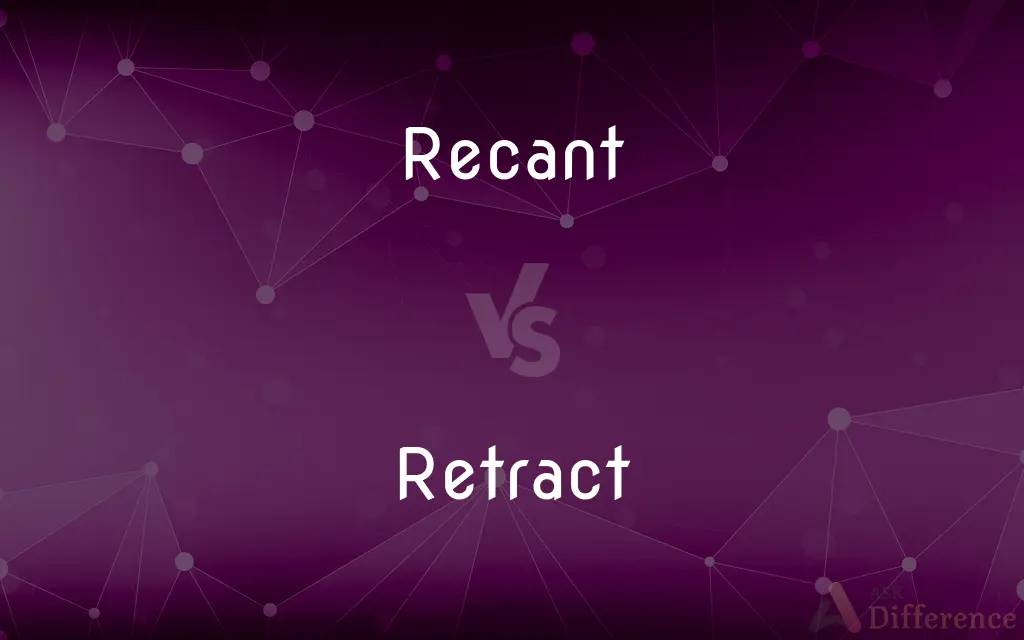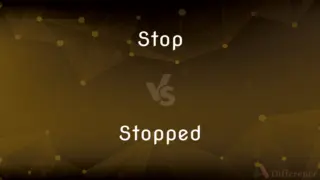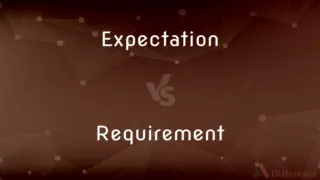Recant vs. Retract — What's the Difference?
By Tayyaba Rehman & Urooj Arif — Updated on April 20, 2024
Recanting involves formally rejecting a previously held belief or statement, often in public; retracting typically means withdrawing a statement or accusation, usually to correct an error.

Difference Between Recant and Retract
Table of Contents
ADVERTISEMENT
Key Differences
Recanting is primarily associated with the public renouncement of a previously expressed opinion or belief, often under pressure or to conform to new evidence. On the other hand, retracting is usually about taking back a statement or claim that is proven to be false or inaccurate, without necessarily involving a change in personal belief.
Individuals recant their statements or beliefs typically when they change their views or wish to dissociate from past statements due to various pressures. Whereas, retraction is more about correcting factual errors in one’s previous statements, often to maintain credibility.
Recantation often occurs in a formal setting, such as during legal proceedings or public declarations, reflecting a significant change in stance or belief. On the other hand, retractions can be formal or informal and often appear in written corrections, such as in media publications or scholarly articles.
The act of recanting can have profound personal and public implications, indicating a major shift in personal ideology or public stance. Conversely, retracting a statement often focuses on the accuracy of specific details rather than a complete ideological shift.
Recantation is sometimes driven by external influences, such as new evidence or social pressures, compelling an individual to publicly change their stance. In contrast, retractions are typically motivated by the need to correct factual inaccuracies or to address subsequent findings that invalidate the original statement.
ADVERTISEMENT
Comparison Chart
Definition
To formally renounce a previously held belief or opinion.
To withdraw a statement or accusation, often to correct errors.
Context
Often used in legal, religious, or public settings.
Common in academic, journalistic, and public discourse.
Implications
Indicates a change in belief or stance.
Focuses on accuracy and truthfulness of information.
Motivation
Can be due to new evidence, social pressure, or personal growth.
Driven by the discovery of errors or new information.
Public Perception
May affect personal or organizational reputation significantly.
Often seen as a responsible act to maintain credibility.
Compare with Definitions
Recant
To abandon one's assertions publicly.
Under new evidence, the witness decided to recant.
Retract
To revoke a declaration or assertion.
The company retracted its initial statement about the incident.
Recant
To withdraw or disavow under pressure.
After widespread criticism, the author recanted his remarks.
Retract
To formally withdraw a statement or opinion.
The journalist retracted the article after discovering errors.
Recant
To retract a statement as incorrect or untenable.
The politician had to recant his controversial policy stance.
Retract
To pull back or disavow a previous claim.
He retracted his earlier accusations.
Recant
To renounce a position once advocated.
She recanted her support for the flawed theory.
Retract
To deny or reverse a previous assertion.
Faced with contrary evidence, she retracted her claims.
Recant
To formally reject a previously held belief.
He recanted his earlier statements during the trial.
Retract
To take back words or statements.
After feedback, the researcher retracted his conclusion.
Recant
Say that one no longer holds an opinion or belief, especially one considered heretical
Heretics were burned if they would not recant
Galileo was forced to recant his assertion that the earth orbited the sun
Retract
To take back; disavow
Refused to retract the statement.
Recant
To make a formal retraction or disavowal of (a statement or belief to which one has previously committed oneself).
Retract
To draw back or in
A plane retracting its landing gear.
Recant
To make a formal retraction or disavowal of a previously held statement or belief.
Retract
To utter (a sound) with the tongue drawn back.
Recant
(ambitransitive) To withdraw or repudiate a statement or opinion formerly expressed, especially formally and publicly.
Convince me that I am wrong, and I will recant.
Retract
To draw back (the tongue).
Recant
To give a new cant (slant, angle) to something, in particular railway track on a curve.
Retract
To take something back or disavow it.
Recant
To withdraw or repudiate formally and publicly (opinions formerly expressed); to contradict, as a former declaration; to take back openly; to retract; to recall.
How soon . . . ease would recantVows made in pain, as violent and void!
Retract
To draw back
A leash that retracts into a plastic case.
Recant
To revoke a declaration or proposition; to unsay what has been said; to retract; as, convince me that I am wrong, and I will recant.
Retract
(transitive)
Recant
Formally reject or disavow a formerly held belief, usually under pressure;
He retracted his earlier statements about his religion
She abjured her beliefs
Retract
To pull (something) back or back inside.
Pull back
An airplane retracts its wheels for flight.
Retract
(rare) To avert (one's eyes or a gaze).
Retract
(phonetics) To pronounce (a sound, especially a vowel) farther to the back of the vocal tract.
Retract
(obsolete) To hold back (something); to restrain.
Retract
(intransitive) To draw back; to draw up; to withdraw.
The bus was stuck at the stop as its wheelchair ramp wouldn’t retract after use.
Muscles retract after amputation.
Retract
(transitive)
Retract
To cancel or take back (something, such as an edict or a favour or grant previously bestowed); to rescind, to revoke.
Retract
To break or fail to keep (a promise, etc.); to renege.
Retract
To take back or withdraw (something that has been said or written); to disavow, to repudiate.
I retract all the accusations I made about the senator and sincerely hope he won’t sue me.
Retract
(games) Originally in chess and now in other games as well: to take back or undo (a move); specifically (card games) to take back or withdraw (a card which has been played).
Retract
(intransitive)
Retract
To decline or fail to do something promised; to break one's word.
Retract
Of something said or written (such as published academic work): to take back or withdraw.
Retract
To change one's mind after declaring an intention to make a certain move.
Retract
An act of retracting or withdrawing (a mistake, a statement, etc.); a retraction.
Retract
A pulling back, especially (military) of an army or military troops; a pull-back, a retreat; also, a signal for this to be done.
Retract
Synonym of retreat
Retract
To draw back; to draw up or shorten; as, the cat can retract its claws; to retract a muscle.
Retract
To withdraw; to recall; to disavow; to recant; to take back; as, to retract an accusation or an assertion.
I would as freely have retracted this charge of idolatry as I ever made it.
Retract
To take back,, as a grant or favor previously bestowed; to revoke.
Retract
To draw back; to draw up; as, muscles retract after amputation.
Retract
To take back what has been said; to withdraw a concession or a declaration.
She will, and she will not; she grants, denies,Consents, retracts, advances, and then files.
Retract
The pricking of a horse's foot in nailing on a shoe.
Retract
Formally reject or disavow a formerly held belief, usually under pressure;
He retracted his earlier statements about his religion
She abjured her beliefs
Retract
Pull away from a source of disgust or fear
Retract
Use a surgical instrument to hold open (the edges of a wound or an organ)
Retract
Pull inward or towards a center;
The pilot drew in the landing gear
The cat retracted his claws
Common Curiosities
What legal implications can recanting have in a courtroom?
Recanting in a courtroom can affect the credibility of the witness and potentially alter the outcome of a case.
How does recanting differ from denying?
Recanting involves withdrawing a previously held belief or statement, while denying involves rejecting a claim or accusation from the start.
How do journalists typically handle retractions?
Journalists handle retractions by publishing corrections in subsequent issues or updates, often noting the error and providing the correct information.
Can a public figure recant a statement made in error without legal consequences?
Public figures can recant statements made in error; however, the consequences depend on the nature of the statement and the laws regarding libel and slander.
What motivates companies to retract product claims?
Companies often retract product claims to comply with regulatory standards, correct misleading information, and maintain consumer trust.
What is the social impact of a high-profile retraction?
A high-profile retraction can affect public trust, influence perceptions of credibility, and impact the reputational standing of individuals or organizations involved.
Can recanting a statement affect someone's personal life?
Yes, recanting can significantly impact personal relationships and public perceptions, potentially leading to social ostracism or support, depending on the context.
What steps should be taken when retracting a scientific claim?
When retracting a scientific claim, it is important to publish a retraction notice in the same venues as the original publication, clearly stating the reasons and maintaining transparency.
Can retracting an inaccurate news report restore a media outlet’s credibility?
Yes, promptly and transparently retracting an inaccurate report can help restore credibility by demonstrating commitment to accuracy and accountability.
Is there a right way to recant a personal opinion on social media?
The right way to recant a personal opinion on social media includes being honest about the reason for the change and addressing the original post directly.
How often do public officials have to retract statements?
Public officials may need to retract statements occasionally, depending on the accuracy of their statements and the feedback received from the public and media.
How does culture influence the process of recanting or retracting statements?
Cultural values regarding honor, shame, and the importance of truth can influence how and when individuals choose to recant or retract statements.
What are the ethical considerations in deciding to retract a professional recommendation?
Ethical considerations include the accuracy of the information at the time of the recommendation, potential harm caused by the recommendation, and the duty to correct misleading information.
What are the consequences of not retracting a false statement?
Not retracting a false statement can lead to legal consequences, loss of credibility, and continued dissemination of misinformation.
What role do ethics play in the decision to recant a testimonial in advertising?
Ethics play a crucial role, as recanting a testimonial involves correcting misleading information that could deceive consumers, reflecting a commitment to honesty and integrity.
Share Your Discovery

Previous Comparison
Stop vs. Stopped
Next Comparison
Expectation vs. RequirementAuthor Spotlight
Written by
Tayyaba RehmanTayyaba Rehman is a distinguished writer, currently serving as a primary contributor to askdifference.com. As a researcher in semantics and etymology, Tayyaba's passion for the complexity of languages and their distinctions has found a perfect home on the platform. Tayyaba delves into the intricacies of language, distinguishing between commonly confused words and phrases, thereby providing clarity for readers worldwide.
Co-written by
Urooj ArifUrooj is a skilled content writer at Ask Difference, known for her exceptional ability to simplify complex topics into engaging and informative content. With a passion for research and a flair for clear, concise writing, she consistently delivers articles that resonate with our diverse audience.
















































